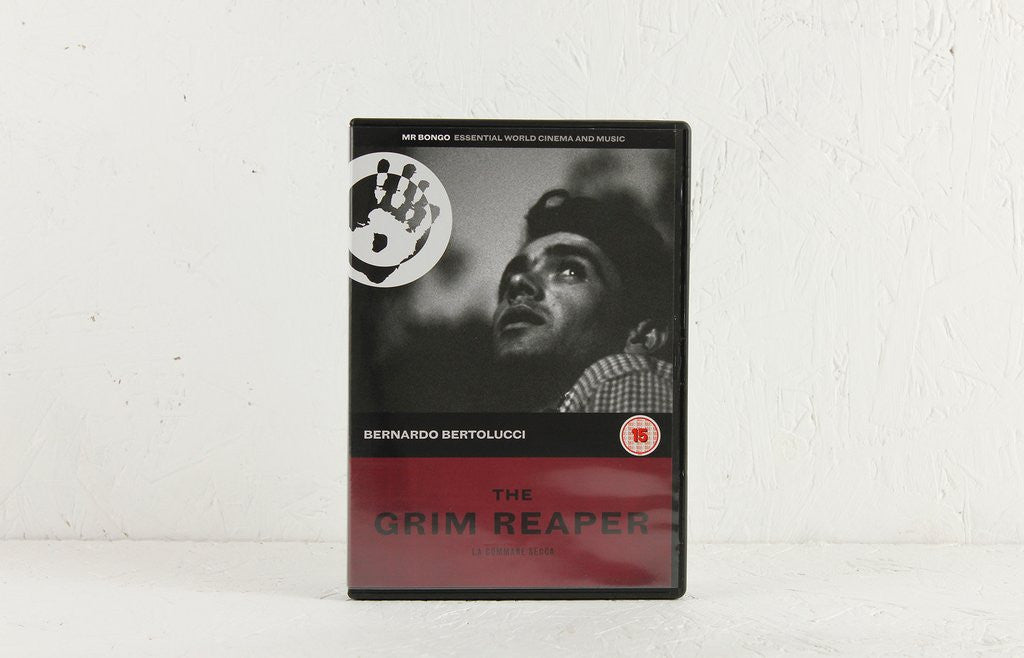
Bernardo Bertolucci proved to be Italian cinema’s great prodigy, making his debut The Grim Reaper at the age of 22, and Before the Revolution at the age of 24; achievements comparable to Orson Welles directing Citizen Kane at the age of 25. He was born in Parma in 1940. He initially followed the footsteps of his father Attilio, a noted poet and critic. His poetry received prizes at competitions and a collection of his work was published while he was still a teenager. But his attention was already diverted to the cinema, especially after viewing Godard’s Breathless. His planned transition from poetry to cinema found an accomplice in fellow poet Pier Paolo Pasolini. A family friend, he regarded Bertolucci as a kindred spirit and tasked him as his assistant on his landmark debut, Accattone. The experience, described by Bertolucci as witnessing “the invention of the cinema” further ignited his own ambitions.
The Grim Reaper was based on a story by Pasolini but the resulting film displayed a visual style at some distance from the director of Mamma Roma. Where Pasolini’s camera was often static, framing his characters as subjects in Renaissance paintings, Bertolucci moved his camera constantly. His was an exuberant cinema, pivoted around visualizations of intense emotional states. Before the Revolution further extended this approach, where the protagonist’s vacillation between political engagement and his restrictive middle-class upbringing was dramatized in images of powerful lyricism. Partner was his first film in colour; it featured Pierre Clementi in a tour-de-force performance which anticipates his collaboration with Marlon Brando. The film was made in 1968, the year in which student protests broke out in different parts of the world. Like the characters of his first films, Bertolucci was a youthful Marxist, one especially attuned to the often schismatic relationship between ideology and personal character. The films which followed probed deeper into these internal schisms, inspired in part by Bertolucci’s experience with psychoanalysis.
He released two films in the year of 1970. The Spider’s Strategem, marked his first collaboration with cinematographer Vittorio Storaro; who, along with art director Ferdinando Scarfiotti and editor/writerFranco Arcalli, became Bertolucci’s most important collaborator. The film revolved around a favorite theme of Bertolucci’s - the son struggling under the shadow of his father. This conflict was taken even further withThe Conformist. This landmark film featured Jean-Louis Trintignant in the title role of a man who wishes to conform to society by transforming into a fascist. The film proved to be a critical and commercial success, its impact rivaled by Bertolucci’s next film. Last Tango in Paris was a sensation in its initial release, a path-breaking exploration of sexual relationships which influenced film-makers from around the world. The honesty with which it explored its subject and Marlon Brando’s performance made it a worldwide commercial success, although the film proved extremely controversial in Italy and other parts of Europe. In Italy, Bertolucci was charged with obscenity and given a suspended sentence with his civil rights revoked for five years.
Novecento (1976) would prove to be Bertolucci’s most ambitious undertaking (rivaled only by The Last Emperor). The film pivoted around an epic clash between peasants and landowners in Italy’s Emilia-Romagna region. The title in Italian meant “The 20th Century” which it chronicles from 1900 to 1945. Despite boasting a cast that comprises of Robert De Niro, Donald Sutherland, Burt Lancaster and Gerard Depardieu, the film failed to find the large public response his previous films had received, although it was a success in Europe. Succeeding features La Luna (1979) and The Tragedy of A Ridiculous Man (1981) gained a muted response while projected adaptations of Red Harvest (with Jack Nicholson) and La Condition humaine failed to come into fruition. The Last Emperor, made in 1987, was a stunning return to form. The first international production to receive access to shoot extensively in China; it became a worldwide success winning nine Oscars including two for Bertolucci (Best Director and Best Screenplay). This was followed by The Sheltering Sky (1990) and Little Buddha (1993), the three films comprising an “Eastern Trilogy”.
He returned to Italy with Stealing Beauty (1996) and Besieged (1998); the latter film cited by critic Jonathan Rosenbaum as one of his best films. The Dreamers (1964) was a nostalgic exploration of 60s Paris, centering on youthful cinephilia and political engagement; a belated return to the themes of Bertolucci’s earliest films. His next film is an adaptation of Niccolò Ammaniti’s You and Me, projected for release in 2012
There are no products in this collection.